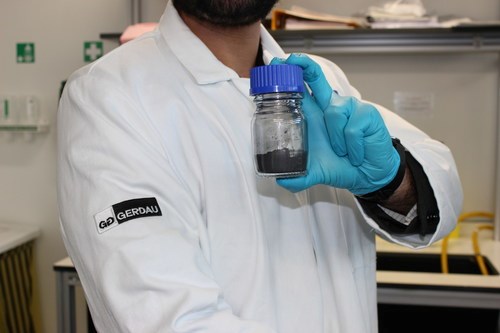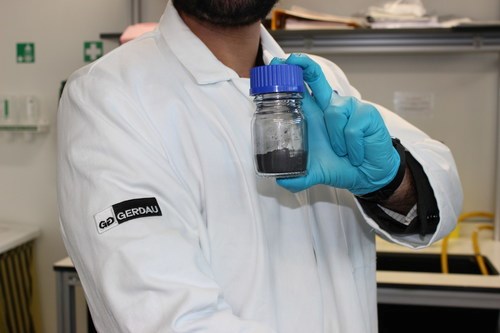
Graphene Masterbatches for Flexible and Rigid Polyolefin Packaging and Beyond

Photo Credit: Gerdau Graphene
In less than a year, I have reported on new entrants in the arena of graphene additives for plastics and their benefits derived from graphene’s mechanical properties such as reduced weight and friction, more efficient lubrication, and higher thermal and electrical conductivity, as well as increased barrier properties against liquids and gases, and protection from weathering oxidation and UV light.
Our most recent reporting has included NeoGraf Solutions and MITO Materials Solutions, as well as on ongoing developments from OCSiAL (U.S. office in Columbus, Ohio), the largest global manufacturer of single-wall carbon/graphene nanotubes and masterbatches for automotive, electronics, and other industries.
Earlier this year, we reported on OCSiAL’s launch of Tuball Matrix 822, a graphene nanotube concentrate, which reportedly provides targeted conductivity to injection molded ABS, PC, filled PPS, and TPU automotive components at working loadings starting from 0.1 wt.% of nanotubes in the final system–an approach that reportedly allows automakers to optimize the painting process and reduce the final production cost. It is said to enable in-line e-painting of exterior plastic parts together with metal components using electrophoresis, where previously, separate production line were required.
More recently, we were approached by Gerdau Graphene, a company that was inaugurated by its 120-yr-old parent company Gerdau last year–Brazil’s largest steel producer, and one of the leading producers of long steel in the Americas and of special steel in the world. Now operating independently new startup nanotechnology company Gerdau Graphene is positioning itself as a major producer of graphene materials for industrial applications in the Americas.
The company has developed what it calls next-generation graphene-enhanced plastics at a Brazilian government-funded advanced materials center in São Paulo. The new graphene-enhanced polymeric resin masterbatch formulas for PE and PP were created in partnership with Brazil’s Instituto SENAI Innovation in Advanced Materials and Nanocomposites, and are being piloted in a series of industrial applications within Gerdau’s factories. The new thermoplastic products created using these formulas are expected to be stronger and offer greater overall performance while costing less to manufacture and producing significantly less waste across the value chain.
The first commercial deliveries were made last month, according to Gerdau Graphene CEO Alexandre. He noted that the company is developing graphene additive masterbatches for virgin resins as well as post-industrial and post-consumer recycled plastics and polymers, including PP, PE, PS, PC, and PVC. Having started sales of its graphene masterbatches in Brazil, the company plans to “move into North America” by end of this year. The company has an office in Tampa, Fla., and its parent company has 14 sites throughout the region.
Initially, the company’s masterbatches are aimed at PE films but Côrrea, expands on their capabilities and goals, “Graphene masterbatches are suitable for application in several polymer processing methods, as we can develop different formulations for each scenario. Our masterbatch is not restricted to flexible film products only, and it can also be used for PE and PP rigid injection molded, blow molded, thermoformed, or extruded parts. For now, we are focusing on the main applications for PE and PP in the market, so when it comes to PE, most of our developments are related to flexible film extrusion, and as for PP, we have been developing solutions for parts produced by injection molding.”
Corrêa notes that Gerdau Graphene works with companies in the commercial sector to help them integrate graphene into new or existing products. One such customer is ‘piloting’ the masterbatches for consumer packaging (CPG) film cases which are about 30% thinner without compromising on strength or durability.
“Plastic is a critical life-saving material that is now used in almost all products in every industry around the world — and its invention has radically transformed how humans live. The biggest challenge we face is how to make plastics better by improving its material qualities, reducing costs, and increasing sustainability throughout its lifecycle. We are now addressing all of these goals. By adding specialized graphene additives to thermoplastic recipes, plastic producers can create stronger, more durable plastic products at a fraction of the cost and with far less petroleum and fewer raw materials needed. Because less plastic is needed for final products, less plastic becomes post-consumer waste. There are also downstream effects, including reductions in manufacturing waste, energy consumption, transportation, and more. And, circularly, plastics can be recycled into graphene and then reused.”
RELATED CONTENT
-
Dishwasher Safe: New Clear Copolyester Is Tougher, More Heat-Resistant, and Processes Easier, Too
In consumer goods markets, there are countless applications for clear plastics such as copolyesters, acrylic, SAN, amorphous nylon, and polycarbonate.
-
Commodity Resin Prices Keep on Climbing
Dips in PP and PET tabs proved temporary, as supply/demand imbalances elevate prices and restrict supplies of all five commodity resins. PS hikes are especially brutal.
-
Plastics That Conduct Heat
Helping electronics, lighting, and car engines keep cool are some new roles for hermoplastics that are formulated to replace metal or ceramic.

Leave a Reply